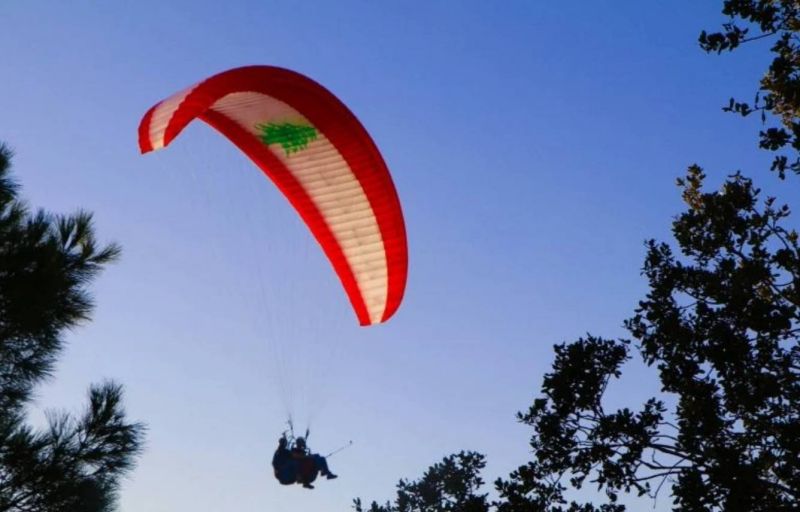
Ecotourism and sports activities are popular among the many visitors that flock to Lebanon in the summer. (Courtesy of the Paragliding Thermal Club)
It is early July and professionals in Lebanon’s tourism sector are already pleased. As they hoped, the summer season is off to a good start, and hints at record success.
“If the security situation remains calm, it is reasonable to expect [a season] better than last year,” said Naji Morkos, co-manager of HODEMA, a tourism and hospitality consulting firm.
The recent developments on Lebanon’s southern border have not (for the time being) clouded tourism prospects.
“Beirut’s International Airport has been receiving an average of 15,000 to 18,000 passengers a day since the end of June. [This figure] peaked with 20,000 passengers on June 25,” said Jean Abboud, president of the Association of Travel & Tourist Agents in Lebanon.
Figures reported in 2022 by caretaker Minister of Tourism, Walid Nassar, indicated that over 1.72 million visitors landed in Lebanon last summer and spent some $5 billion. At a conference in Dubai in May, Nassar estimated that Lebanon could expect no less than 2.2 million visitors (mostly in the summer) over the year and generate at least $9 billion in revenue.
“I think we are well on the way to exceeding 1.8 million visitors, and even looking forward to the 2 million mark for the summer, with as usual, a majority of expatriates coming to spend their holidays in their countries of origin,” said Abboud.
According to Abboud, the management of this influx at the airport has improved since last week, despite the continuing pressure on the infrastructure.
Regarding revenues, exact statistics for 2022 have not been updated by Banque du Liban (BDL).
Traffic at the airport rose by 23 percent in the first half of the year to 3.71 million passengers — most of them arrivals.
Restaurants and beaches
Once in Lebanon, visitors don’t stay home. Beaches are typically overrun and some are sometimes forced to turn people away in the middle of the day, particularly in Batroun in North Lebanon and Jounieh in Kesrouan.
“ It’s a good start of the season for restaurants in Beirut, on the beach and in the mountains,” said Tony Rami, President of the Lebanese Restaurant, Nightclub and Café Owners' Association.
“During the weekends, many chains are fully booked, whether restaurants, bars, or even terraces or beaches set up for the summer,” he added, contradicting the recurrent criticism about the rise in prices since April.
According to Morkos, there were around 6,000 restaurant chains in Lebanon before the crisis. This number fell sharply with the crisis, but in May, Rami said around 250 new outlets had recently opened.
Hotels and AirBnb
For the association of hotels, the season that has just begun looks like a “copy” of the previous one. “The majority of visitors are from the diaspora and stay with their families. Some of them are tempted by local tourism and organize short breaks elsewhere on the coast or in the mountains,” said the head of the Lebanese Hotel Association, Pierre Achkar.
“As a result, hotels and guest houses are busier and can easily sell out from Thursday to Sunday than during the rest of the week,” Achkar added.
Achkar also noted that the capital’s luxury hotels are also very busy. Not all of them have reopened after the 2019 crisis and the Beirut port explosion that devastated the city on Aug. 4, 2020.
The hotels’ association does not have data on activity related to private rental accommodation. When contacted, a spokesperson for More than a Bed, a company that manages more than 70 properties rented out on the AirBnb platform, said that all its addresses in Beirut had been fully booked since the run-up to the Adha holidays.
Sport and ecotourism
Achkar said that the Chouf, North Lebanon and Kesrouan regions are making “a lot of effort” to promote their localities and that “ecotourism and unusual sporting activities” are especially trending.
Raja Saade, founder of the country’s first paragliding club, Club Thermique in Jounieh, agreed. “The season made a good start and the schedules of our seven instructors are as full as last year. We’re at maximum capacity,” he said.
Lebanon has around seven paragliding sites.
Tania Ballane, ecotourism manager at the Association for the Protection of Jabal Moussa natural reserve, a popular hiking spot in the Kesrouan, said there was a noticeable increase in visitor numbers. “And not only Lebanese,” she told L’Orient-Le Jour, noting that many visitors were“Egyptian, Iraqi, Canadian and even French.”
The only apparent blot on this idyllic picture is that Lebanon still does not offer a tax-free service to tourists. Global Blue, the only company to offer this type of service, suspended its activities in February and has since been negotiating with the authorities to be able to deal directly with merchants.
This article was originally published in French in L'Orient-Le Jour. Translation by Joelle El Khoury.